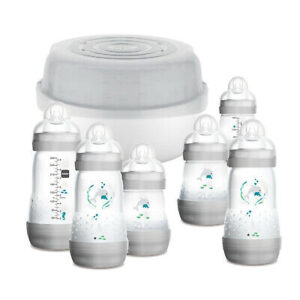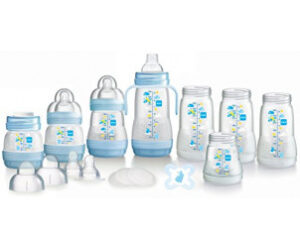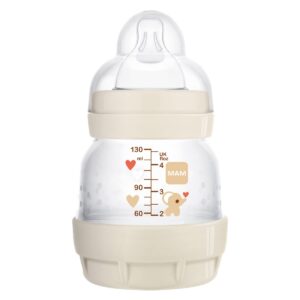As a parent, you always want to ensure that your child is healthy and safe. However, with the convenience that bottle-feeding offers, it can sometimes be easy to overlook the risks that come with it. Did you know that bottle-feeding equipment can harbour disease-causing bacteria and other germs if not properly handled, cleaned, and sterilized? These germs can lead to dangerous infections in infants, which can be life-threatening. In this blog post, we’ll dive deeper into the issue of infections due to bottle feeding and provide you with helpful tips on how to keep your little one safe and healthy.
Importance of properly handling, cleaning, and sterilizing bottle-feeding equipment
Properly handling, cleaning, and sterilizing bottle-feeding equipment is crucial for ensuring the health and safety of infants. Germs and bacteria can quickly grow in milk residue left in bottles and other feeding equipment, which can lead to infections and illnesses. That’s why it’s vital to clean equipment right after every feeding using hot soapy water and a bottle brush to scrub inside bottles and teats. Sterilizing bottle-feeding equipment until your baby is 12 months old also helps to reduce the risk of infection. There are many ways to sterilize equipment, such as boiling, chemical sterilization, and using automatic units that heat your equipment to a temperature high enough to kill bacteria. Properly handling and cleaning feeding equipment can help prevent illness and keep your baby safe and healthy. Remember, cleanliness is key when it comes to feeding your little one!
Possibility of disease-causing bacteria and germs in formula and milk
It is important to note that formula and milk can be contaminated with disease-causing bacteria and germs. This can happen during the manufacturing process or during preparation and storage. One such contaminant is Cronobacter sakazakii, which can cause serious illnesses in infants younger than 2 months or those who were born prematurely. This bacteria can be found in powdered infant formula, powdered milk, herbal teas, and starches. It can also be found in contaminated feeding items like breast pump equipment. Proper hygiene and cleaning practices for feeding items and hands can help minimize the risk of infection. It is also recommended to avoid using a microwave to warm bottles and to take extra precautions when preparing powdered formula. Parents should be vigilant of the manufacturer’s instructions when preparing specialty metabolic formulas. By following proper hygiene and cleaning practices, parents can help protect their infants from illness caused by contaminated formula and milk.
Cronobacter Infection and Infants
Explanation of Cronobacter infection in infants
Cronobacter infection in infants can be a serious and even fatal illness. This type of infection is caused by a germ found in the environment called Cronobacter. It is particularly good at surviving in dry foods like powdered infant formula, which can become contaminated during processing or at home. Infants younger than two months, those born prematurely, and those with weakened immune systems are most at risk for Cronobacter infection. Symptoms may include poor feeding, irritability, temperature changes, jaundice, grunting breaths, or abnormal body movements. It is essential to take steps to reduce the risk of contamination in handling, cleaning, and sterilizing feeding equipment. Cleaning, sanitizing, and storing feeding items safely, proper handwashing techniques, avoiding the use of a microwave to warm bottles, and extra precautions for powdered formula can help reduce the risk of infection. It is important to always follow manufacturer’s instructions when preparing formula, and to contact a healthcare professional immediately if you suspect your baby has become ill.
Relationship between powdered infant formula and infections
It is important for parents to be aware of the relationship between powdered infant formula and infections. While infections caused by formula are rare, they can be life-threatening, especially for infants younger than 2 months and those with weakened immune systems. Over 90% of these infections have been linked to powdered infant formula (PIF). It’s important to note that PIF is not sterile and can have germs in it, and contamination can occur in processing facilities or in homes. The World Health Organization and the US FDA have established guidelines for PIF production, preparation, and storage to reduce the incidence of neonatal infections. Parents should take extra precautions with powdered formula, such as not placing formula scoops on contaminated surfaces and using hot water to prepare the formula. Proper cleaning and sanitizing of feeding items and following handwashing techniques are also important for preventing infections. By understanding the risks and taking necessary precautions, parents can help protect their infants from infections caused by bottle feeding.
Ways in which powdered formula can get contaminated
Powdered infant formula is not sterile and can be contaminated with bacteria during processing, packaging, and storage. It is important to handle and store formula properly to prevent contamination and infection in infants. The powder can get contaminated if it comes into contact with contaminated surfaces, hands, water, or feeding bottles. For instance, formula lids or scoops placed on contaminated surfaces can easily introduce bacteria to the powder. Powdered formula mixed with contaminated water or in a contaminated bottle can also lead to infections. Indeed, a rare but often fatal infection of the bloodstream and central nervous system in infants, known as Cronobacter infection, has been associated with contaminated infant formula. Therefore, it is necessary to take extra precautions when handling powdered formula, such as cleaning, sanitizing, and storing feeding items safely, as well as using liquid formula when possible. By following these precautions, parents can help prevent contamination and keep their infants healthy and safe.
Infants most at risk for infections
Infants are the most vulnerable to infections caused by contaminated feeding equipment, formula, and milk. Those under two months old and those with weakened immune systems, such as premature babies or those undergoing medical treatment, are the most at risk. Infections caused by Cronobacter, a bacteria found in powdered infant formula, can cause serious health complications in infants, including sepsis and meningitis. Other infectious diseases associated with formula feeding include pneumonia and diarrhea. Proper handling, cleaning, and sterilizing of bottle-feeding equipment, as well as safe preparation and storage of formula, can significantly reduce the risk of infections. It is also recommended to avoid using a microwave to warm bottles and to take extra precautions when using powdered formula to prevent contamination. Caregivers should be diligent in maintaining a clean and safe feeding environment to ensure the health and safety of infants.
Symptoms of illness in infants
It is important for parents to recognize the symptoms of illness in their infants. Some common signs include lethargy, refusal to eat, fever, and respiratory symptoms. Lethargy may be a sign of infection or low blood sugar, and it’s important to consult a doctor if your infant becomes lethargic or less active. Fever is also a common symptom, and it’s important to monitor your baby’s temperature and call the doctor if it reaches a certain level. Respiratory symptoms, such as coughing and difficulty breathing, can also be a sign of illness and should be addressed promptly. Additionally, a baby who refuses to eat or has trouble sucking may be experiencing a feeding problem, which can be a sign of illness. As a parent, it’s important to pay close attention to your baby’s behavior and contact a doctor if you notice any concerning symptoms. Taking these steps can ensure your baby receives the medical attention they need to stay healthy and happy.
Prevention of Infections
Cleaning, sanitizing, and storing feeding items safely
Proper handling, cleaning, and sterilizing of bottle-feeding equipment are essential to keep our babies safe from infections and diseases. Cleaning and sanitizing procedures can help prevent the growth of germs and bacteria. It is important to wash feeding items with hot soapy water and rinse them by holding them under running water. Dishwashing is also an option, but small items should be separated to prevent them from getting stuck in the dishwasher filter. After washing, baby items should be left to air dry thoroughly before storage in a clean, dust-free area. To ensure extra protection, baby feeding items can be sanitized using boiling, steam sterilization, or chemical sterilization. Proper cleaning and sanitizing not only protect our babies from infections and illnesses, but it also gives peace of mind to parents knowing they are doing everything possible to keep their babies safe.
Proper handwashing techniques
Proper handwashing techniques are crucial in preventing the spread of infections, especially when it comes to bottle-feeding infants. It’s important to wash your hands with soap and water for at least 20 seconds before handling bottles and feeding equipment. Alcohol-based hand sanitizers can also be used, but they are not a replacement for proper handwashing. Make sure to clean between your fingers, under your nails and up to your wrist. It’s also important to wash your hands before and after preparing formula, before handling the baby and after changing a diaper or using the bathroom. By following these simple steps, you can help prevent the transmission of germs and keep your baby healthy. Proper hand hygiene is one of the best ways to protect your baby from infections, and it’s a simple habit that can make a big difference.
Safe preparation and storage of formula
When it comes to preparing and storing infant formula, there are certain precautions that should be taken in order to reduce the risk of infections in babies. First and foremost, it’s important to always read and follow the instructions on the formula container carefully. Make sure to clean and sanitize the workspace and all feeding equipment before preparing bottles. Use only safe water to mix the formula and avoid using a microwave to warm the bottles, as this can result in hot spots that can burn your baby’s mouth. Prepared formula should not be left out at room temperature for more than two hours and any formula left in the bottle after feeding should be thrown away. Always store unopened formula containers in a cool, dry place and use the prepared formula within 24 hours if refrigerated. Proper handwashing techniques should also be followed at all times. By taking these extra precautions, you can help ensure your baby’s health and safety during bottle feeding.
Avoiding the use of a microwave to warm bottles
As tempting as it may be to quickly warm up your baby’s bottle in the microwave, it’s important to avoid this method for heating formula or milk. Microwaves heat unevenly, and there may be hot spots in the formula that could burn your baby’s mouth and throat. Furthermore, exposing plastics to high heat can cause chemicals to leach out, which is not safe for your baby. A safer method for heating a bottle is to run it under hot running water for a minute or two or to set it in a bowl of hot water for a few minutes. Be sure to test the temperature before feeding it to your baby by swirling the bottle around and shaking a couple of drops onto the back of your hand. If it feels too hot, let it cool for a couple of minutes and check again before feeding it to your baby. Taking these precautions can help keep your baby safe from burns and harmful chemicals.
Extra precautions for powdered formula
When it comes to preparing powdered formula for your baby, it’s essential to take extra precautions to ensure that the powder does not get contaminated. One of the biggest risks is bacterial growth, which can occur if the formula is not properly stored or the utensils used to prepare the formula are not clean. To minimize the risk of contamination, it’s important to always wash hands thoroughly before handling the powder and to use only clean, sterilized utensils and bottles. Additionally, it’s recommended to use boiled or bottled water to prepare the formula, as tap water may contain harmful bacteria. Once the formula is prepared, it should be refrigerated immediately and discarded after 24 hours. When in doubt, it’s always best to err on the side of caution and take extra steps to ensure that your baby’s formula remains safe and unspoiled.
Bacterial Outgrowth in Feeding Bottles
Explanation of bacterial outgrowth in feeding bottles
Bacterial outgrowth in feeding bottles is a cause of concern for parents who are bottle feeding their babies. When the milk or formula is left at room temperature, bacteria can grow and multiply. This happens because bacteria thrive in warm temperatures and nourishing environments. As they grow, they produce toxins that can make your baby sick. Infants who are less than 4 months old are especially at risk as their immune systems are not fully developed. The best way to prevent bacterial outgrowth is to prepare only the amount of formula that your baby will consume at each feeding, and then discard any leftovers. Always clean and sanitize the feeding bottles, nipples, caps, and other feeding items before and after each use. Don’t leave the items unwashed or with milk residue, as this can promote bacterial growth. It’s also important to store the feeding items in a clean and dry place to avoid contamination. By following these simple steps, you can help keep your baby healthy and free from bacterial infections.
Importance of properly cleaning and sterilizing bottle-feeding equipment
Properly cleaning and sterilizing bottle-feeding equipment is crucial for the health of your baby. Babies have a still-developing immune system, making them more susceptible to infections caused by bacteria and germs found in formula and milk. Therefore, it’s important to reduce the chances of them getting sick by cleaning and sterilizing each bottle, teat, and screw cap after every feed until they’re 12 months old. Milk is an excellent medium for bacteria to grow, which is why it’s important to keep formula cold until just before feeding your baby, and to properly wash and sterilize all feeding equipment. There are three ways to sterilize equipment: boiling, steam sterilization, and chemical sterilization. You could choose a method based on what’s most suitable for you. Maintaining good hand hygiene and storing formula safely are also essential elements. By taking these precautions, you can help keep your baby healthy and safe from infections caused by contaminated equipment and formula.
Can Bottle Feeding Cause an Infection?
Overview of bottle feeding as a source of infection
Bottle feeding is a common way to nourish babies and children who are unable to breastfeed. However, improperly handling, cleaning, and sterilizing bottle-feeding equipment can increase the risk of infections caused by disease-causing bacteria and germs found in formula and milk. There is also a possibility of contamination of powdered infant formula during preparation due to poor hygiene practices or environmental factors. Infants are most vulnerable to infection from contaminated formula or bottles, and symptoms may include diarrhea, vomiting, and fever. To reduce the risk of infection, caregivers should follow proper handwashing techniques, clean and sanitize feeding items safely, prepare and store formula properly, and avoid warming bottles in the microwave. An extra precaution should be taken when using powdered formula to reduce the risk of bacterial outgrowth. It is important to understand that bottle feeding can be a potential source of infection and to take measures to prevent this from happening.




